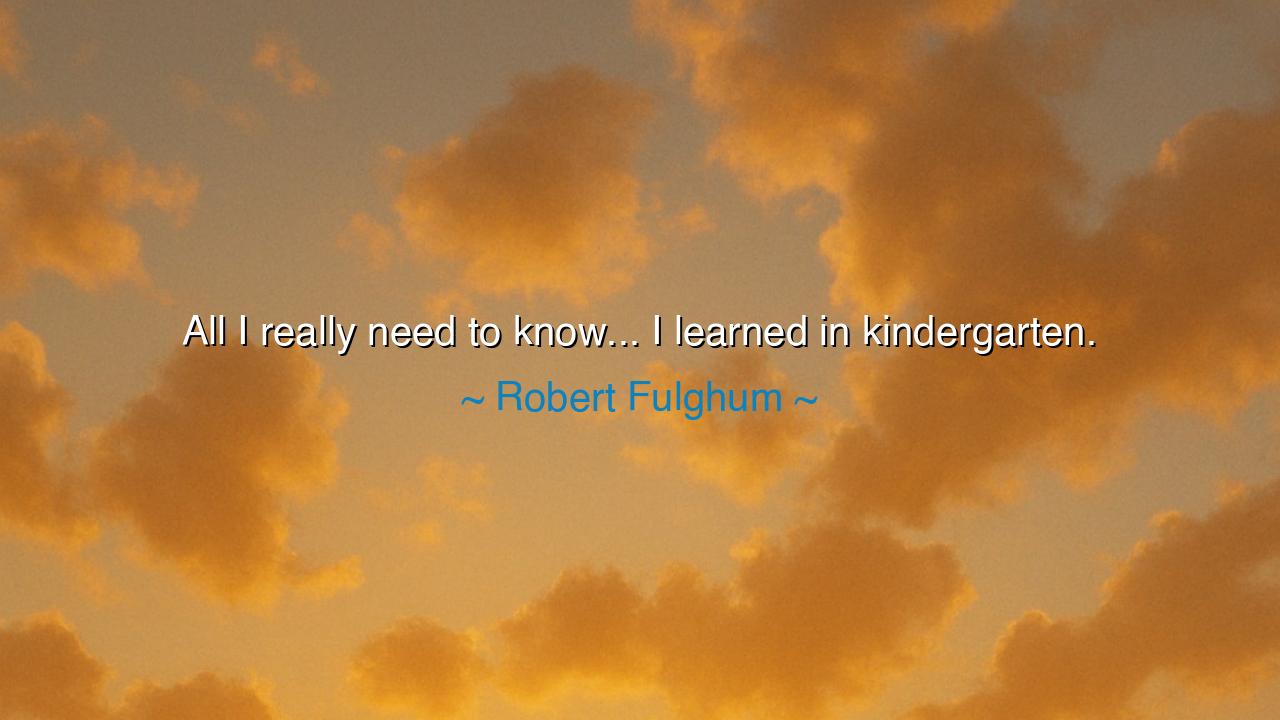
All I really need to know... I learned in kindergarten.






“All I really need to know... I learned in kindergarten.” Thus wrote Robert Fulghum, the modern sage who found profound truth in the simplicity of childhood. His words, though gentle and familiar, carry the weight of an ancient wisdom—a reminder that the great lessons of life are not hidden in temples or universities, but spoken softly in the classrooms of our earliest years. In this quote, Fulghum reveals a paradox that humbles even the learned: that the rules which govern a good and meaningful life—kindness, honesty, sharing, and wonder—are the same ones we were taught when our hearts were still pure and unguarded.
To understand the origin of these words, we must recall that Fulghum was both a writer and a minister, a man who had seen the heights and depths of human nature. In his 1988 book All I Really Need to Know I Learned in Kindergarten, he sought to distill the chaos of modern life into something understandable, human, and enduring. He looked not to the scholars of the ages, but to the children—for in their innocence, he saw truth untarnished by pride or fear. The quote is not a sentimental musing, but a spiritual declaration: that wisdom is not the accumulation of knowledge, but the preservation of goodness. The lessons we learn before pride and ambition take root—play fair, say you’re sorry, clean up your mess, hold hands, and look both ways before crossing the street—are the same principles that, if remembered, could heal the wounds of the world.
The ancients, too, would have understood Fulghum’s message. The philosopher Socrates taught that wisdom begins with humility, with the admission that we know nothing. The Buddha spoke of the beginner’s mind—open, curious, and uncorrupted by assumption. And Christ himself said, “Unless you become as little children, you shall not enter the kingdom of heaven.” The child’s heart is the original teacher of virtue. Before we learn how to disguise our emotions or manipulate others, we know instinctively how to share joy, how to forgive, how to marvel at the world. Fulghum’s words remind us that enlightenment is not a discovery of new truths, but a return to forgotten ones.
Consider the story of Mahatma Gandhi, who once said that everything he ever needed to know about living rightly was found in the first lines of the children’s prayer he learned as a boy: “Truth is God.” Gandhi, who led a nation without a weapon, did not rely on political cunning or worldly power; he relied on the simple virtues—truth, compassion, patience, and fairness—that all children are capable of understanding. The mightiest movements of history, from the Sermon on the Mount to the march to the sea, were guided not by complex theories, but by principles that could be written on a blackboard in a kindergarten classroom.
Fulghum’s wisdom shines in contrast to the complexity of our age. We live in a world that prizes sophistication, that measures intelligence in degrees and titles. Yet, as Fulghum reminds us, the essence of humanity is simple. We do not need a doctorate to be kind. We do not need wealth to share. We do not need power to tell the truth. The chaos of adult life—politics, business, conflict—might all be soothed if we remembered the lessons of childhood. What if nations learned again to take turns, to apologize when wrong, to care for the weak, to never hit first? The child’s simplicity, far from naïve, is the foundation of civilization.
And yet, the tragedy of adulthood is that we forget. As we grow older, ambition hardens the heart, and fear clouds the mind. We learn to compete instead of cooperate, to value being right over being kind. Fulghum’s quote is a mirror held before us—a quiet rebuke to our arrogance. It asks: When did we lose the wisdom we once had? When did “sharing” become a weakness, “honesty” a liability, and “wonder” a distraction? To learn again what we once knew as children is to return to truth, to rediscover the moral clarity that modern life has buried beneath noise and speed.
So, my child of both wisdom and weariness, take this teaching to heart: live simply, live kindly, live as you once did before the world taught you to harden. When you speak, let your words be honest; when you act, let your motives be pure. Share what you have. Help where you can. Do not let the sophistication of adulthood extinguish the light of innocence within you. Every moral code, every philosophy, every scripture ever written returns to these same truths—that love is better than hate, giving better than taking, forgiveness stronger than vengeance.
For in the end, Fulghum’s quote is not nostalgia—it is prophecy. “All I really need to know... I learned in kindergarten.” The world’s salvation, if it is to come, will not arise from new inventions or ideologies, but from old virtues remembered anew. Teach them to your children, but more importantly, remember them yourself. For life, in all its grandeur and sorrow, remains a playground—and we are still its children, learning, falling, and, if we are wise, still helping each other back up.






AAdministratorAdministrator
Welcome, honored guests. Please leave a comment, we will respond soon